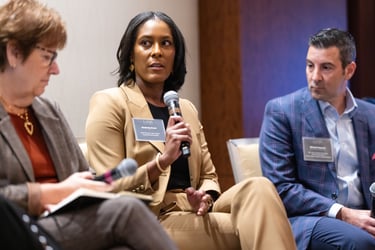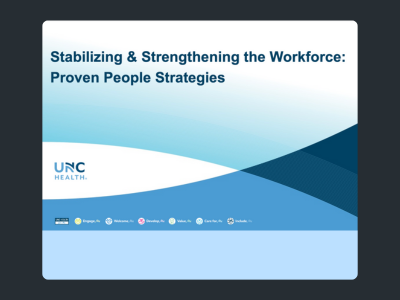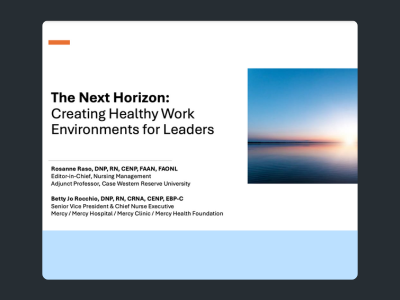Healthcare’s Next Horizon
Key Takeaways from LINE 2024:
At LINE 2024, senior health system executives - CEOs, COOs, CHROs, CNOS, and more – gathered with other industry experts to explore the theme of “Healthcare’s Next Horizon” over two days in Boston. In engaging and inspiring discussions, cross-functional leaders collaborated to envision what’s ahead in healthcare and explore strategies to best set their organizations up for success – with a focus on empowering the people who make healthcare happen.
Stabilizing and Retaining the Healthcare Workforce
A focus area highlighted throughout the event was deploying new strategies to stabilize and retain the healthcare workforce, particularly within the critical first year of employment. Nursing and Talent Executives from Nebraska Medicine and UNC Health shared the impactful results they’ve achieved using leader-focused technology as part of holistic strategies to boost engagement and retention across the frontline workforce. Consistent communication, targeted technology adoption, and regular, meaningful leadership engagement emerged as essential drivers for successful workforce retention.
Explore More:
- Stabilizing + Strengthening the Workforce: Proven People Strategies
- Reducing Frontline Turnover: A Focus on the First Year
Creating Strong Organizational Cultures for Success
Executives underscored the critical need to build a cohesive internal culture centered on transparency, communication, and alignment with mission-driven objectives. This is only heightened during times of M&A, as leaders from organizations like Northwell Health and Cleveland Clinic shared. Effective alignment both within the C-suite and between the C-suite and frontline leaders was also a focus. Discussions focused on leveraging communication to cascade system-level goals into actionable, unit-level priorities. Tools like huddle boards, scorecards, and workforce technology have proven effective in translating strategic goals into concrete actions on the frontline to drive outcomes. Organizations like Hartford Healthcare showcased the impact of system-wide cultural initiatives, such as H3W, in uniting teams around shared objectives and behaviors.
Explore More:
Moving from Complex Bureaucracy to Human-Centered Leadership
Leadership today requires a human-centered approach that prioritizes empathy, relationship-building, and authenticity. Effective leaders must balance operational priorities with team support to drive engagement. Creating an ownership culture and structure involves empowering individuals to think and act as leaders, encouraging the generation, testing, and swift adoption of high-quality ideas. By shifting focus from purely efficiency-driven systems to ones centered on impactful accomplishments, organizations can realize financial and organizational benefits that engage and reward everyone involved. Building a strong organizational culture depends on alignment between the C-suite and frontline teams, achieved through clear communication and unified goals.
Explore More:
Leveraging AI and Technology as Workforce Enablers
AI and advanced technologies are transforming healthcare by easing staff workloads and boosting efficiency. With many possible applications, intentional use is essential—especially in balancing AI for both clinical and non-clinical workflows. Leaders discussed strategic AI use to streamline administration, reduce turnover, and improve care quality, prioritizing measurable impact, ease of adoption, and goal alignment. Deb Muro, CIO at El Camino Health, highlighted how AI tools have optimized workflows and boosted employee engagement, while frontline enablement discussions focused on AI’s role in empowering nurse managers to focus on high-skill tasks, practicing at the top of their license.
Explore More:
Shifting Workforce Well-being Beyond Resilience
The focus is shifting from individual resilience-focused efforts to systemic solutions that address foundational, system-wide improvements to bolster workforce well-being over the long-term. John Howard of the CDC shared an actionable framework for health systems developed as part of the organization’s Impact Wellbeing Campaign focused on healthcare worker burnout and wellbeing. Executives from health systems like Mercy Health also individually shared operational improvements they’re making to create healthier work environments that reduce burnout and elevate morale. Key initiatives include more flexible scheduling, structured recognition programs, and robust support systems for both staff and leadership.
Explore More:
.jpg?width=375&height=250&name=C24_Laudio_LINE_0255%20(1).jpg)
.jpg?width=375&height=250&name=C24_Laudio_LINE_1260%20(1).jpg)





Event Resources


The Next Horizon: Creating Healthy Work Environments for Leaders
Betty Jo Rocchio, DNP, CRNA, CENP, Chief Nurse Executive, Mercy, St. Louis
Rosanne Raso, DNP, RN, CENP, NEA-BC, FAAN, FAONL, Editor-in-Chief, Nursing Management; At Large Director, AONL
.png?width=800&height=600&name=pdf%20(4).png)
.png?width=800&height=600&name=pdf%20(2).png)
Healthcare Workforce Trends
Gretchen Berlin, Senior Partner, Healthcare Systems & Services, Operations, and Public Sector Practices, McKinsey & Company
.png?width=800&height=600&name=pdf%20(3).png)
Impact Wellbeing: How Healthcare Leaders Can Step Up to Ensure Worker Wellbeing
John Howard, MD, MPH, JD, LLM, MBA, Director, NIOSH (CDC), and Administrator, WTC Health Program
.png?width=800&height=600&name=pdf%20(5).png)
Leader Inspired Work
Empower today's frontline leaders for success with practical, evidence-based insights from 100+ healthcare managers and executives
%20LINE%20Speaker%20Highlights%20-%20Graphic%20for%20LINE%20Homepage%20(1000%20x%20500%20px)%20(1000%20x%20300%20px)%20(7).png)